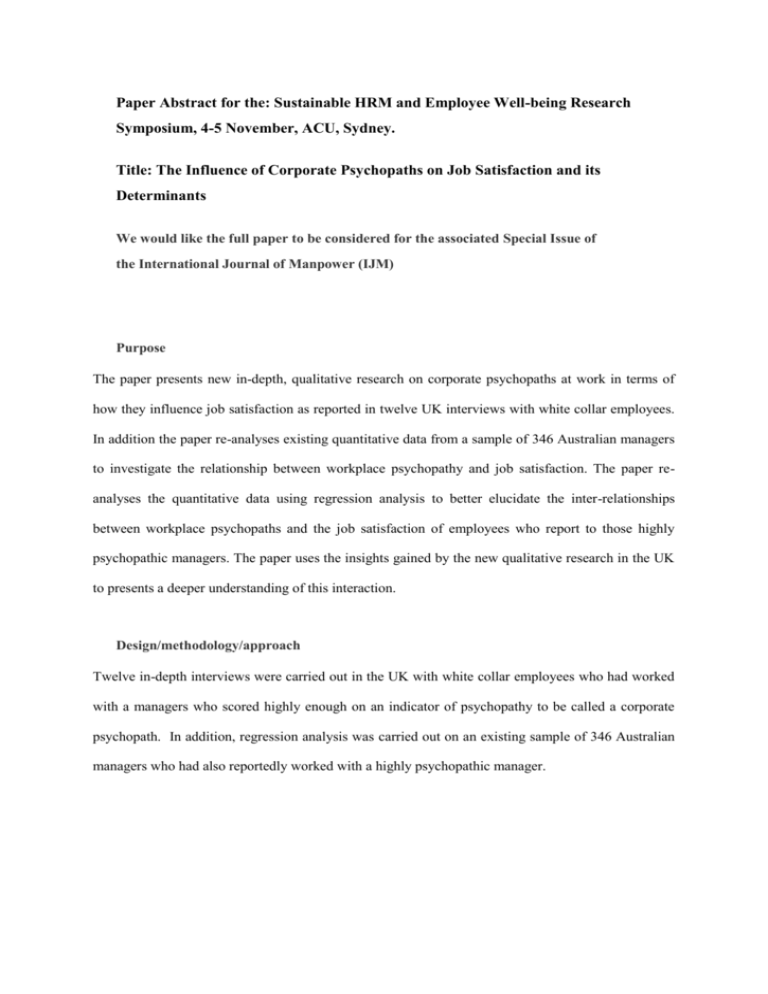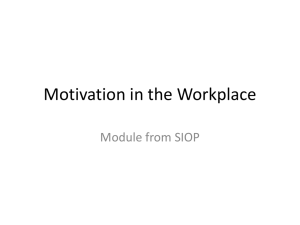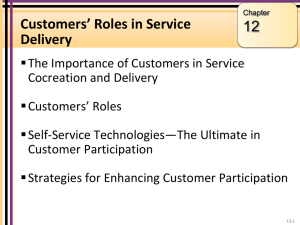Paper Abstract for the: Sustainable HRM and Employee Well
advertisement

Paper Abstract for the: Sustainable HRM and Employee Well-being Research Symposium, 4-5 November, ACU, Sydney. Title: The Influence of Corporate Psychopaths on Job Satisfaction and its Determinants We would like the full paper to be considered for the associated Special Issue of the International Journal of Manpower (IJM) Purpose The paper presents new in-depth, qualitative research on corporate psychopaths at work in terms of how they influence job satisfaction as reported in twelve UK interviews with white collar employees. In addition the paper re-analyses existing quantitative data from a sample of 346 Australian managers to investigate the relationship between workplace psychopathy and job satisfaction. The paper reanalyses the quantitative data using regression analysis to better elucidate the inter-relationships between workplace psychopaths and the job satisfaction of employees who report to those highly psychopathic managers. The paper uses the insights gained by the new qualitative research in the UK to presents a deeper understanding of this interaction. Design/methodology/approach Twelve in-depth interviews were carried out in the UK with white collar employees who had worked with a managers who scored highly enough on an indicator of psychopathy to be called a corporate psychopath. In addition, regression analysis was carried out on an existing sample of 346 Australian managers who had also reportedly worked with a highly psychopathic manager. Key findings Job satisfaction has previously been seen as a function of various constructs. We take one step back from the literature to examine the relationship not just between job satisfaction, workplace conflict, organizational constraints, withdrawal from the workplace, and perceived levels of corporate social responsibility, but also between all of these constructs and the presence of corporate psychopaths. We find that there is a direct link between corporate psychopaths and job satisfaction. There is also an indirect link through variables such as conflict, since corporate psychopaths influence conflict. Further, the research establishes that psychopathy is the dominant predictor of job satisfaction. Research implications This current research establishes that corporate psychopaths have a large influence on job satisfaction and on some of the other organisational outcomes that determine job satisfaction such as conflict. This corresponds with and extends, research into the antecedents of leader-employee exchange which has shown that the personality traits of leaders and of employees influence the development and quality of leader-follower exchanges, which in turn influence job effectiveness and satisfaction (Janssen & Van Yperen 2004). An understanding of the causes of conflict, bullying and abusive behaviour is also furthered by this research. Additionally, the empirical evidence for the prevalence of abusive supervision has been reported to be weak and a gap in knowledge has been reported in terms of understanding the causes of abusive behaviour (Tepper 2000). This current paper illuminates some of the personality trait correlates of abusive supervision and bullying. Corporate psychopaths have the traits of being callous and unemotional towards those who report to them. Previous research into the relationship between job stressors, negative affectivity, and counterproductive work behaviour, that was designed to investigate the effects of workplace incivility on employee satisfaction; indicated that incivility, organizational constraints, and interpersonal conflict are negatively related to job satisfaction and positively related to counterproductive work behaviour (Penney & Spector 2005). Therefore, it seems likely that although counterproductive work behaviour was not specifically measured in this current research, it would probably be an area of fruitful research into the effects of corporate psychopaths on organizations. Similarly job satisfaction levels have been found to be robust predictors of organizational citizenship behaviour (Organ & Ryan 1995) and so the presence of corporate psychopaths can be expected to have a major impact here as well (Organ & Ryan 1995; Lapierre & Hackett 2007; Moorman 1993). Further research is called for in these areas. Practical implications We argue that the implications of these research findings are important for future research into a wide variety of areas of management research. For example, corporate psychopaths influence job satisfaction, as shown by this current research, and job satisfaction in turn influences turnover decisions as shown by previous research (Tett & Meyer 1993; Hershcovis & Barling 2010). In practical terms it can be logically expected that there will be a link between the presence of corporate psychopaths and turnover. This current research did not measure intention to quit (the intention to leave an organization). However, it logically follows that the intention to quit will be higher when corporate psychopaths are present in an organization because of the increased levels of interpersonal aggression and hostility and lower levels of job satisfaction that their presence directly or indirectly generates. Job satisfaction, workplace withdrawal behaviours and intention to quit are often linked in the literature (Hom & Kinicki 2001; Grandey, Dickter & Sin 2004). This has implications for the hiring practices of HR professionals. Social implications Our findings add to the evidence that psychopathic individuals are not related to success, as some psychology researchers argue (Smith et al. 2013; Lilienfeld et al. 2012). Rather, psychopathic managers decrease the job satisfaction of almost everyone who works for them. This implies that the calls for the screening of psychopathic managers out of positions of responsibility are more well-founded then recent papers on this subject have argued (Smith & Lilienfeld 2013). Smith and Lilienfeld conclude that not enough is known about psychopaths in the workplace to support calls for workplace screening for psychopathy. On the other hand other writers on psychopathy support calls for psychopathy screening so that close management and supervision of these potentially highly disruptive people can be implemented (Boddy et al. 2015). References Boddy, C. R., Miles, D., Sanyal, C. & Hartog , M. 2015, 'Extreme Managers, Extreme Workplaces: Capitalism, Organisations and Corporate Psychopaths', Organization, vol. 2, no. 4, pp. 530 551. Grandey, A. A., Dickter, D. N. & Sin, H.-P. 2004, 'The customer is not always right: customer aggression and emotion regulation of service employees', Journal of Organizational Behavior, vol. 25, no. 3, pp. 397 - 418. Hershcovis, M. S. & Barling, J. 2010, 'Towards a multi-foci approach to workplace aggression: A meta-analytic review of outcomes from different perpetrators', Journal of Organizational Behavior, vol. 31, no. 1, pp. 24 - 44. Hom, P. W. & Kinicki, A. J. 2001, 'Toward A Greater Understanding of How Dissatisfaction Drives Employee Turnover.' Academy of Management Journal, vol. 44, no. 5, pp. 975 - 987. Janssen, O. & Van Yperen, N. W. 2004, 'Employees' Goal Orientations, The Quality Of LeaderMember Exchange, and the Outcomes of Job Performance and Job Satisfaction.' Academy of Management Journal, vol. 47, no. 3, pp. 368 - 384. Lapierre, L. M. & Hackett, R. D. 2007, 'Trait conscientiousness, leader-member exchange, job satisfaction and organizational citizenship behaviour: A test of an integrative model', Journal of Occupational and Organizational Psychology, vol. 80, no. 3, pp. 539 - 554. Lilienfeld, S. O., Waldman, I. D., Landfield, K., Watts, A. L., Rubenzer, S. & Faschingbauer, T. R. 2012, 'Fearless dominance and the US presidency: Implications of psychopathic personality traits for successful and unsuccessful political leadership.' Journal of Personality and Social Psychology, vol. 3, pp. 489 - 505. Moorman, R. H. 1993, 'The Influence of Cognitive and Affective Based Job Satisfaction Measures on the Relationship Between Satisfaction and Organizational Citizenship Behavior', Human Relations, vol. 46, no. 6, pp. 759 - 776. Organ, D. W. & Ryan, K. 1995, 'A Meta-Analytic Review Of Attitudinal And Dispositional Predictors Of Organizational Citizenship Behavior', Personnel Psychology, vol. 48, no. 4, pp. 775 - 802. Penney, L. M. & Spector, P. E. 2005, 'Job stress, incivility, and counterproductive work behavior (CWB): the moderating role of negative affectivity', Journal of Organizational Behavior, vol. 26, no. 7, pp. 777 - 796. Smith, S. F. & Lilienfeld, S. O. 2013, 'Psychopathy in the workplace: The knowns and unknowns', Aggression and Violent Behavior, vol. 18, pp. 204 - 218. Smith, S. F., Lilienfeld, S. O., Coffey, K. & Dabbs, J. M. 2013, 'Are psychopaths and heroes twigs off the same branch? Evidence from college, community, and presidential samples', Journal of Research in Personality, vol. 47, no. 5, pp. 634-646. Tepper, B. J. 2000, 'Consequences Of Abusive Supervision.' Academy of Management Journal, vol. 43, no. 2, pp. 178 - 190. Tett, R. P. & Meyer, J. P. 1993, 'Job Satisfaction, Organizational Commitment, Turnover Intention, And Turnover: Path Analyses Based On Meta-Analytic Findings', Personnel Pyschology, vol. 46, no. 2, pp. 259 - 293.







